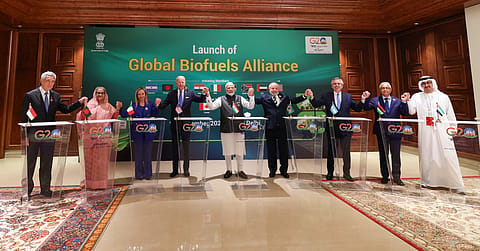How India Scripted Consensus on G20 Delhi Declaration
According to him, India's G20 Presidency achieved the historical consensus on the Russia-Ukraine issue because the leadership worked with all the emerging markets

India's G20 Presidency was able to reach a consensus on the G20 Leaders' Delhi Declaration because of the joint efforts of four developing countries, led by India, says Amitabh Kant, India's G20 Sherpa.
Addressing a webinar on the "Outcome of G-20 New Delhi Summit" organised by Delhi based policy research institute Research and Information System for Developing Countries (RIS) on September 13, he said that "the discussions on Russia-Ukraine issue were driven by four developing countries (India, Brazil, South Africa, and Indonesia) who are taking up the mantle of G20."
According to him, India's G20 Presidency achieved the historical consensus on the Russia-Ukraine issue because the leadership worked with all the emerging markets. "It was very important that we worked as a true voice of the Global South (developing countries). India from the start to finish led this process with the Global South and for the Global South," Kant said.
India's G20 sherpa also pointed out that there was 100% consensus on all issues, from all countries, as the Delhi Declaration of G20 has no footnote, no reservation, or no chair summary. "We brought consensus on all development issues and geopolitical issues confronting the world. We brought the sherpas of Brazil, South Africa, Indonesia all together. And along with us we constantly discussed with all emerging markets and we found that Mexico, Argentina, Saudi Arabia, Turkey, all aligned themselves with us. And therefore we made it clear from the beginning that what matters to us is an agenda and outcome that will deliver for the Global South," he said.
The Delhi Declaration calls on big powers to respect international law and norms. Kant said that this was crucial for true multilateralism in a divided world and this alone can ensure stability, growth and development. "It was crucial to demonstrate that G20 as a grouping with diverse perspective which are truly multipolar. The unity demonstrated by the global south in core global issues during India G20 Presidency has been unprecedented. This demonstrated that India has the ability to bring all emerging markets, the developed world, Russia, China all together on critical issues. It also demonstrated that multilateralism is important in today’s world. It also demonstrated that consensus building is hard but possible and genuinely needed in the world becoming increasingly complex and dynamic. It is clear that such consensus building has to be driven by global south," he explained.
Kant quoted the International Monetary Fund (IMF) to point out that 80% of the global economic growth is going to come from emerging markets this year and for the next two decades, two third of the growth will come from emerging markets. "The arc of history and growth is shifting radically towards the South and it is important that their voice is heard. Brazil and South Africa are the incoming presidencies and they have stood like pillars with India and supported us in strategy, process and persuasion. Indonesia also joined us. They took this agenda as their own and delivered for all developing countries. Our philosophy throughout has been that no one should be left behind. This ensured that we kept our focus on peace. India sent the biggest peace message to the world on an issue (Ukraine- Russia conflict) the world has evaded any agreement," he said.
Kant also said that now that India has achieved a robust consensus on key global issues during this G20 presidency, the next step will be to ensure its implementation at all levels.